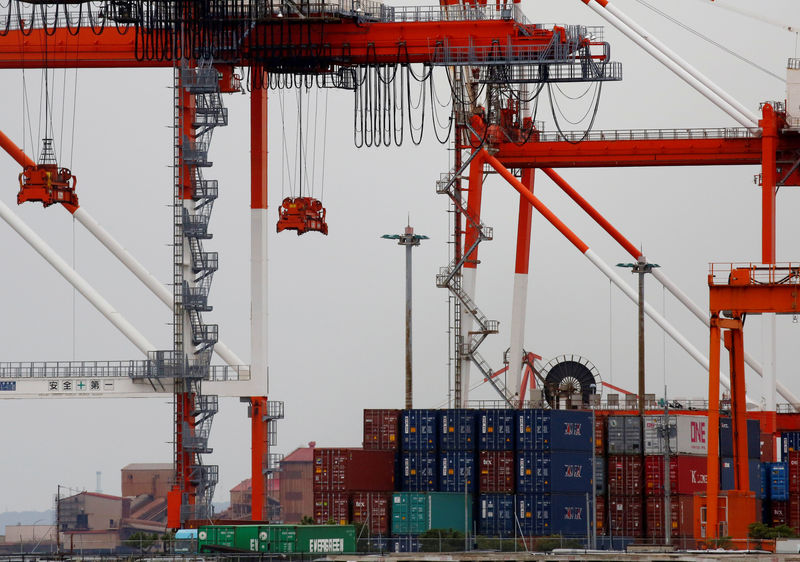By Stanley White and Tetsushi Kajimoto
TOKYO (Reuters) - Japanese exports contracted for the fifth month in April due to a slump in shipments of chip-making equipment to China, underlining the growing threat to the world's third-biggest economy from a bruising Sino-U.S. trade war.
Data also showed Japan's trade surplus with the United States rose for a second month as auto exports accelerated, which could draw U.S. President Donald Trump's ire before U.S.-Japan trade negotiations begin this week followed by a leaders' summit a few days later.
Trump's government is trying to renegotiate trade agreements with major economies to lower the U.S. trade deficit and address what it considers to be unfair trade practices.
That approach has set-off an intensifying tariff dispute between the United States and China - two major trading partners of Japan - in a blow to global businesses, trade and overall growth.
Washington's stance is doubly harmful to Japan because it has slammed the breaks on exports to neighboring China and exposes the trade-reliant economy to curbs on its shipments of cars to the United States.
"Some Japanese companies are still optimistic about a resolution to recent trade friction, but the implications are quite serious," said Hiroshi Miyazaki, senior economist at Mitsubishi UFJ Morgan Stanley (NYSE:MS) Securities.
"On one hand, we may reach a point where Japanese companies shift production from China or other places. On the other hand, Japanese policymakers need to make sure U.S.-Japan trade stays out of the spotlight."
Ministry of Finance (MOF) data showed on Wednesday Japan's exports fell 2.4% in April from a year earlier, down for a fifth straight month. That compared with a 1.8% drop seen by analysts in a Reuters poll, and a similar 2.4% decline in March.
Exports to China fell 6.3% in April from a year earlier, down for the second consecutive month.
The data also showed Japan's trade surplus with the United States rose 17.7% in April from a year earlier to 723.2 billion yen ($6.55 billion), partly led by an 8.3% increase in auto exports.
U.S. Trade Representative Robert Lighthizer will visit Japan on May 24 to meet Economy Minister Toshimitsu Motegi to accelerate trade talks ahead of a leaders' summit a few days later, according to two sources with direct knowledge of the plan.
TRUMP THREAT, AUTO EXPORT RISK
Trump angered foreign automakers by declaring that some imported vehicles and parts posed a national security threat, and Tokyo fears the U.S. government could attempt to set a quota on Japanese car imports.
The specter of a drawn-out trade war comes at a delicate time for Japan's economy.
Gross domestic product (GDP) data out Monday showed Japan's growth unexpectedly accelerated in January-March because imports fell more than exports, suggesting domestic consumption was weakening at the same time external demand had turned down.
Indeed, the GDP data showed declines in consumer and business spending, a bigger source of concern as companies worried about the future.
Last month, imports rose 6.4% on-year from a 1.2% gain in March, thanks to increases in oil and related purchases.
Faltering overseas demand and weak consumer spending could keep policymakers under pressure to forego a twice-delayed tax hike in October, although a rebound in manufacturers' confidence may ease some fears of a recession in the world's third-largest economy.
Japanese manufacturers' morale improved in May for the first time in seven months, a Reuters poll showed on Wednesday.
However, two-thirds of companies surveyed expect economic growth to remain flat in the second quarter, while 82% of firms believe Japan's economy is not fully prepared for a planned tax hike, a Reuters monthly poll showed.
Investors are closely watching the government's monthly report due later this week for a possible downgrading of its view that the economy is in a gradual recovery, which would rekindle speculation about a tax hike delay.
To be sure, there are some positive signs for Japan's economy.
Core machinery orders, a highly volatile data series regarded as an indicator of capital spending in the coming six to nine months, rose 3.8% in March, separate data on Wednesday showed. That confounded expectations for a 0.7 percent decline.
Furthermore, manufacturers surveyed by the Cabinet Office forecast core orders to jump 15.7% in April-June after a 3.2% decline in the previous quarter.
In Japan, a sales tax increase to 8% from 5% in April 2014 hit consumers hard and triggered a sharp economic slump.
Since then Abe has delayed the planned tax hike to 10% twice as he prioritized economic growth over fiscal reforms, despite the industrial world's heaviest public debt burden, which sits at twice the size of Japan's $5 trillion economy.
